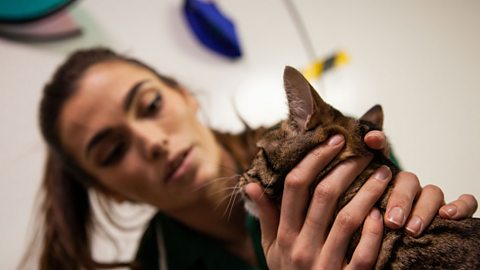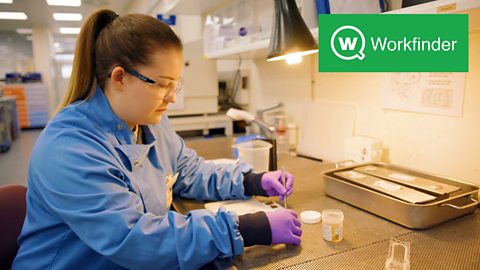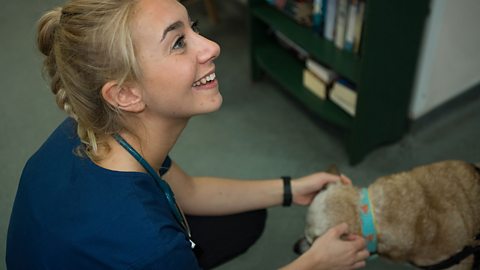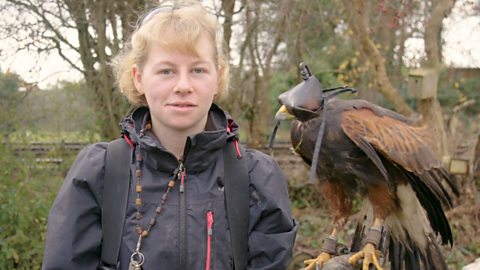Meet Kirstie, 22, from Surrey, and find out about her life as head veterinary nurse at Medivet in London. Part of our Bitesize world of work series.

Teamwork is essential in this job. It gets you through the hard days.
How would you describe your job?
I'm head veterinary nurse at a veterinary practice. This means I manage my team of nurses, vets and receptionists and ensure the practice is running smoothly.
We also take care of our patients – this includes assisting in surgery, general nursing care, and administration tasks.

What skills do you use in your job?
There are lots of skills you learn from this job. You have to be switched on and motivated. We also have to build relationships with the families and pet owners by being professional and caring.
Is this the job you always wanted to do?
I didn't know this job existed at first.
The job brings together medical knowledge and caring which is why I was interested in it. We go from advising families how to give medicine to their pets to caring for very poorly animals.

Was it a smooth journey to finding your job?
No it wasn't! I didn't qualify for the Veterinary Nursing course straight away because I didn't get the right grade in my Maths GCSE. Instead, I started as a patient care assistant, where I learnt the basics of working in a vet practice.
When I was 16, I was working full time and going to college to get the credit I needed for my course. It was tough – I didn't have the "normal" life going out with friends because I was really busy. But it was so worth it because I've qualified as a veterinary nurse and have a career I'm really enjoying.

Top tips
- Work hard and use as much initiative as you can because this is what will get you far
- If this is something you're interested in, get your qualifications as soon as you can because this will open other doors. For example, I'm now working towards a certificate in critical and emergency care
- If you don't get the grades you need first time, there are other options. I didn't get my Maths GCSE but I was able to study a year of Animal Nursing Care and get my qualification which led to my Veterinary Nurse course.

What to expect if you want to be a veterinary nurse
- Veterinary nurse average salary: £18,000 to £26,000 per year
- Veterinary nurse typical working hours: 35 to 40 hours per week
What qualifications do you need to be a veterinary nurse?
You could get into this role via a university course. You could do a foundation degree or degree in veterinary nursing accredited by the Royal College of Veterinary Surgeons. You'll need at least one A-level, or equivalent, for a foundation degree or two to three A- levels, or equivalent, for a degree. Alternatives to A-levels include taking a T-level in Animal Care and Management (England only, from Sept 2023), which is equivalent to three A-levels. Check with your course provider which alternative qualifications they accept. Other alternatives include a college course such as a Level 3 Diploma, where you'll spend some time in the classroom and periods of training on placement in veterinary practice. You can also volunteer with a vet, a local kennel or animal welfare centre, or with animal charities like the PDSA or RSPCA to get some experience before training.
Sources: LMI for All, National Careers Service, GOV.UK
This information is a guide and is constantly changing. Please check the National Careers Service website for the latest information and all the qualifications needed and the GOV.UK website for more on T-levels.
For careers advice in all parts of the UK visit: National Careers Service (England), nidirect (Northern Ireland), My World of Work (Scotland) and Careers Wales (Wales).


Work experience in your area
Find work experience placements with Workfinder.
Tips and advice
Help with interviews, writing a CV and all things work experience related.


Lucy: vet
Lucy uses her knowledge of Biology in her job as a vet.

Know your strengths and weaknesses. video
How knowing your weaknesses could be your biggest strength.

Florrie: bird of prey specialist. video
Florrie runs her own falconry business.
